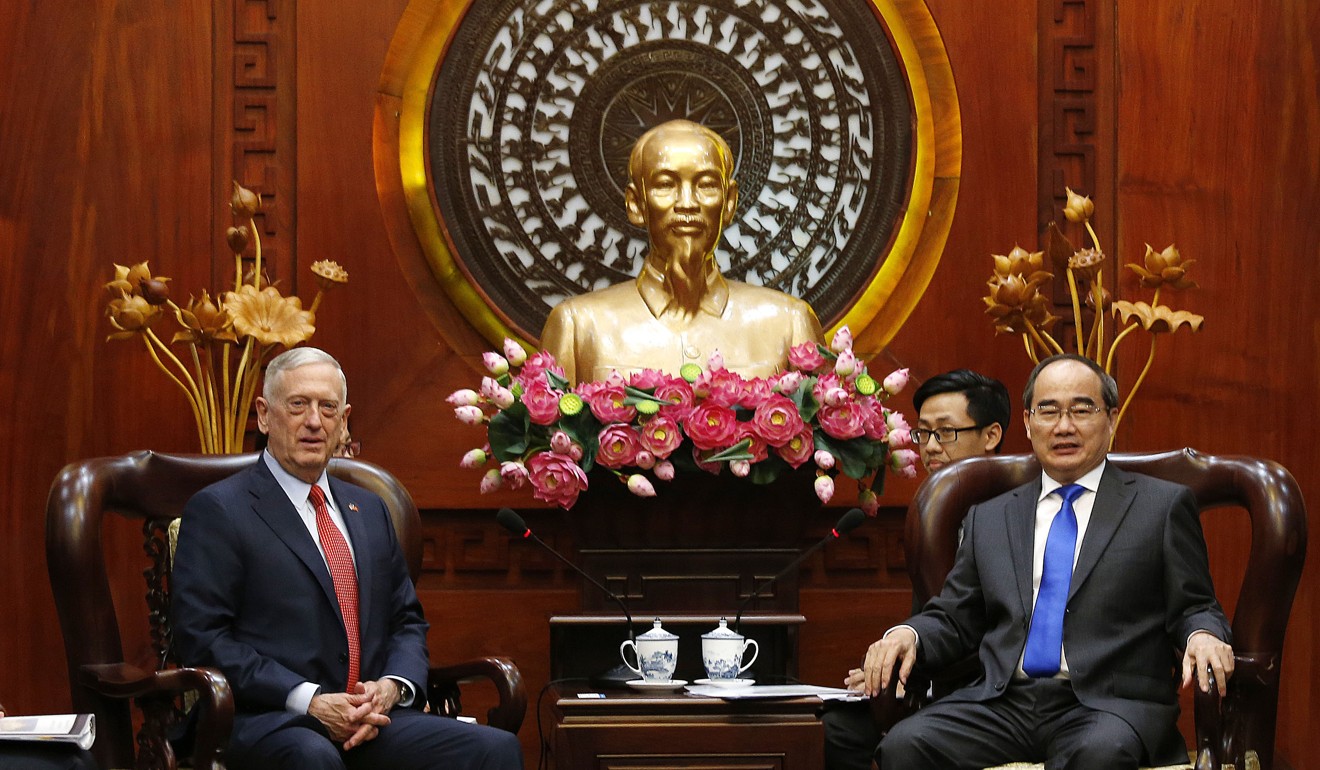
US Defence Secretary James Mattis hits out at ‘predatory’ Chinese behaviour
Pentagon chief highlights Washington’s concerns about activities in South China Sea and practice of forcing smaller countries to run up significant debts
US Secretary of Defence James Mattis said Washington was highly concerned about China’s “predatory” behaviour and militarisation of the South China Sea but insisted Washington was not trying to contain the country.
Mattis was speaking en route to Vietnam, where he arrived on Tuesday to meet with officials to bolster military ties between Hanoi – which has its own competing claims in the South China Sea – and Washington.
His comments followed the speech made by Vice-President Mike Pence on October 4 that laid out US grievances with China.
South China Sea set to top agenda at Asean defence ministers’ meeting
Mattis, a former general, highlighted not only US concerns about the disputed waters, but also Beijing’s piling of unnecessary debt on smaller countries to pay for Chinese-funded infrastructure projects.
“We remain highly concerned with the continued militarisation of features in the South China Sea,” he said, saying that this continued to happen despite a pledge by President Xi Jinping not to do so.
He continued that “we look at the – what we consider to be almost predatory, in some cases certainly predatory – economic behaviour” of China, which was encouraging smaller countries to pile on “massive debt” that “fiscal analysis would say they are going to have difficulty, at best, repaying”.
But Mattis said the US wanted a relationship with China grounded in fairness, reciprocity and “respect for international rules and for all nations’ sovereignty, whether they’re large or small”.
“We’re not out to contain China,” he added.
Mattis said the US and China were cooperating where possible, highlighting North Korea as an example. “We are not seeing a more military, confrontational approach vis-à-vis China,” he added.
He said China and the US would sometimes “step on each other’s toes” as two large powers in the Pacific, and had to find ways to manage their relationship.
Last month a Chinese naval vessel nearly collided with the USS Decatur near the disputed Spratly Islands in the South China Sea, prompting Mattis to cancel a trip to Beijing.
China’s military reaches out to neighbours with joint drill
US government sources subsequently told CNN they were planning more “freedom of navigation” operations in the South China Sea and Taiwan Strait.
However, Cui Tiankai, China’s ambassador to the US, blamed the Americans for the incident, saying the Decatur was sailing close to Chinese waters.
He also argued that Beijing was not to blame for the tensions between the two sides because its warships were not “going to the coast of California or to the Gulf of Mexico”.

But Mattis dismissed that argument, saying that even if Chinese ships did sail to the Gulf of Mexico, they would be in international waters.
“The South China Sea is one of the most heavily trafficked international sea lanes of communication,” he said. “So when the Chinese ships are putting bumpers over the side of it, you don’t do that when you’re out in the middle of the ocean, unless you’re intending to run into something.”
Mattis’s visit to Ho Chi Minh City is his second trip to Vietnam this year, having visited the capital Hanoi in January.
US versus China? Put that cold war talk on ice
His meeting with Defence Minister Ngô Xuân Lich, will be the fifth time he has met his Vietnamese counterpart and he described the Southeast Asian country as a “growing defence partner”.
Mattis will also attend the Asean Defence Ministers Meeting in Singapore on Thursday.
He said the US considers the Association of Southeast Asian Nations “central to the security interest and maintaining peace in the … Pacific”.
In an echo of the language US officials use to describe their relationship with China, he also said Washington wanted a “constructive relationship so prosperity and security grow together, not apart”.

